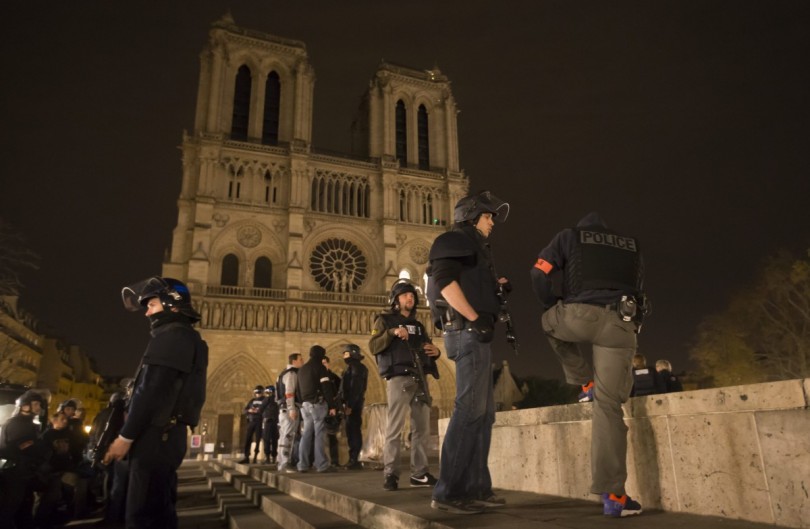Terrorism Attacks on the Russian Airliner and Paris and What They Will Mean to You!
This month has not been easy for specialists in tourism security. We first witnessed the terrorist bombing of the Russian aircraft causing not only death and destruction to innocent civilians but also a major blow to Egypt’s tourism industry. Friday afternoon, Texas time, the first reports of November 13th terrible attacks in Paris began to come through the newswires.
It is still too early to provide a full security picture of the events. The French police are correctly holding back information and being during their investigation not to provide the “enemy” with needed details. Although these attacks may not have been a direct assault against the tourism industry, we do know that the venues attacked all were places of public gatherings and formed the backbone of tourism. As such, it is essential that everyone in tourism be well aware of the consequences of these attacks and learn from them. It is not possible to determine at this moment (November 14) if these attacks have now run their course or if other attacks will follow in the days ahead.
In reading this article please note that it does not attempt to ascertain the causes or responsibility for these attacks but rather examines only the consequences of these attacks on the tourism industry as a whole and presents ideas for tourism’s continued viability in an age of terrorism.
The Russian airline attack and the Paris attacks will force the travel industry to deal with a major travel paradigm shift. France closed its borders and the idea of an open Europe may now be coming to an end. This shift in travelers’ mindsets that occurred after September 11, 2001 may soon return and the western nations which for the last 7 years have viewed terrorism as a criminal act rather than as an act of war. National leaders may now have to reassess their Modus Vivendi. The Paris terrorist attacks, and the possibility of new attacks, have given the travel and tourism a new major wake-up call and will force the industry once again to place tourism security at the top of its priority list.
Unfortunately, many in the travel and tourism industry had hoped that in the years since September 11, 2001 tourism security could once again be placed on the back burner. Put in its simplest of terms; travelers will once again demand good tourism security and not only at airports, but at public venues, restaurants, hotels and stadiums. In the old travel industry paradigm, security was in too many locations the industry’s step child or “dark secrete.” Industry leaders rarely spoke about threats to tourists in public fearing that such openness would scare away visitors. The common belief has been that security was a “necessary evil” that one had to have, but that security added nothing to the business’ bottom line. For this reason, tourism and travel security were rarely publicized, never mentioned in marketing campaigns, under-funded, and its practitioners were often under-paid. The old paradigm led to poor security at airports, hotels, restaurants and attractions. Security professionals who spoke of acts of terrorism, bio-chemical attacks, and crime were seen as alarmist and tourism marketers often asked security professionals to rephrase their warnings in ways that would be acceptable for public consumption.
If the public perception changed after September 11, the attacks against the Russian airliner and the city of Paris will mean that tourism officials who ignore security are placing their entire industry in peril. The bottom line will be simply where there is no security tourism will perish, but in those locales where tourism security is professionalized and well thought through, the tourism industry will continue to flourish.
The Post Paris paradigm for the travel and tourism industry is based on the fact that tourism security is now a major part of a location’s marketing strategy.
Below are some suggestions and ideas to help you prepare for this new and dangerous world.
Get over denial, it can happen in your community. Recognize that no part of the world today is immune from a terrorist attack. Too many parts of the travel and tourism market simply do not believe that an attack can happen to them. It can! Furthermore, as the media often devotes a great amount of coverage to an attack against a tourism area, the fear factor spreads from one locale to entire regions, nations, and even continents.
- Recognize that there is a fundamental political shift in the world. Old assumptions will no longer hold. The tourism industry will need to recognize that the Islamic State and other terrorist groups are at war with it. From a business perspective t old assumptions about the world are very dangerous. Those parts of the travel and tourism industry that emphasize security will have a good chance of surviving. The venues that provide give good security mixed with good customer service will flourish. Those parts of the travel and tourism industry that hold on to the old way of thinking will fade away.
- Develop coordinated efforts between security professionals and tourism professionals.Tourism professionals need to see security professionals and tourism police as allies. That means that tourism professionals must work to insure well-trained TOPPs (Tourism Oriented Policing and Protection units) officers. These TOPPs units should exist in any city that has a major tourism industry or sports stadium.
- Develop a tourism task force. People who should be on this task force are local officials, tourism officials, and transportation officials. The key to this task force is the quality of your facilitator.
- Do not create a false sense of security.Gas masks will do nothing in case of a biological or chemical attack, while sealed rooms may be very useful. Much of what done at airports is a form “Security Theater” that, as seen in the recent downing of a Russian airliner over Egypt’s Sinai Peninsula, does not address real problems. Do not panic people, but deal with safety and security issues in the most professional manner possible. People begin to panic not when you take precautions in a professional manner, but when you fair to take precautions.
- Invite specialists to help train not only security personnel but also tourism officials. All too often tourism officials do not attend security training and merely leave security issues in the hands of unpaid and underfunded security specialists. People lecturing must be both specialists in security and in travel and tourism. Remember terrorism against tourism is not a passing emergency, but now a permanent way of life with an ‘state” (The Islamic State) seeking to undermine the totality of tourism. Travel and tourism industry professionals who are in denial and refuse to accept this new political reality are risking their business’ health are making a costly error.
- Develop security coalitions with all components of your community.Make sure that your police department is trained and understand tourism, make sure that you hotel and attraction workers know how to handle a security emergency. This is also a time for regionalization. For example, if your state tourism conference has never had an expert speak on tourism security, ask why not? Both rural and urban areas should be thinking about the security of their guests.
- Know what is unsafe in your community and work with local governments to improve these security concerns. How safe is your local airport? Are cab drivers’ backgrounds investigated? Who has access to a guest’s room? Who is working behind the scenes at airports? Are these people vetted (have their personal backgrounds checked)?
- Send representatives to tourism security conferences.The oldest and most famous one is held each year in Las Vegas. Every major CVB should have a representative at a tourism security conference along with at least one member of its law enforcement agency. This year’s conference is from April 10-13 and information can be obtained at www.touristsafety.org
- Make sure that all police personnel and security personnel are aware of how important tourism security is to their community’s reputation and economic health. Most police have never been trained in good tourism security. It is essential to have a person work with your local police who can “translate” between tourism and security issues.
- Security and safety may have different meanings to scholars, but in the world of travel they are one and the same.In the world of terrorism against tourism any lack of either safety or security may result in the destruction of a tourism industry.
- Remember that the best crisis management is good risk management!It is a lot cheaper to stop an attack then it is to recover from an attack. In both the case of the Russian airliner and the Paris attacks, it appears that tourism officials were taken by surprise. The cost of these surprise attacks cannot only be measured in economic costs but also in the cost of lives destroyed, and reputations ruined. The tourism industry’s number one priority must be to do everything possible and to work with security agencies so as to assure the safety and security of its guests but also to insure the viability of the tourism industry.
Due to the shortness of time, this article is being published only in English. We offer apologies to our Spanish and Portuguese readers.
Debido a la necesidad de publicar este artículo inmediatamente, lo hemos escrito solamente en inglés. Mil disculpas a nuestros lectores en español y en portugués.
Por causa do tempo mínimo dado para escrever este artigo, esse artigo será publicada somente em Inglês, pedimos desculpas aos nossos leitores dos exemplares escritos em Espanhol e em Português.







